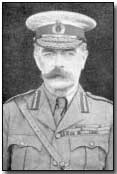Primary Documents - Lord Kitchener on the Battle of Sari Bair, 6 August 1915
 Reproduced below is
British Minister of War
Lord Kitchener's report on
the Allied attempt to
seize control of Sari Bair on
6 August 1915, as part of the
Gallipoli campaign.
Reproduced below is
British Minister of War
Lord Kitchener's report on
the Allied attempt to
seize control of Sari Bair on
6 August 1915, as part of the
Gallipoli campaign.
Generally regarded as a failure - the operation was eventually abandoned in its entirely at the close of 1915 - Kitchener's report attempted to place as fine a gloss as possible on Allied operations initiated both on and immediately after 6 August 1915.
Click here to read Commander-in-Chief Sir Ian Hamilton's report on the events initiated on 6 August 1915. Click here to read the newspaper account filed by journalist Ellis Ashmead-Bartlett.
The Battle of Sari Bair by British Minister of War Lord Kitchener
On the Gallipoli Peninsula during the operations in June several Turkish trenches were captured. Our own lines were appreciably advanced and our positions were consolidated.
Considerable reinforcements having arrived, a surprise landing on a large scale at Suvla Bay was successfully accomplished on the 6th of August without any serious opposition.
At the same time an attack was launched by the Australian and New Zealand corps from the Anzac position, and a strong offensive was delivered from Cape Helles in the direction of Krithia. In this latter action French troops played a prominent part and showed to high advantage their usual gallantry and fine fighting qualities.
The attack from Anzac, after a series of hotly contested actions, was carried to the summit of Sari Bair and Chunuk Bair, dominating positions in this area. The arrival of transports and the disembarkation of troops in Suvla Bay were designed to enable troops to support this attack. Unfortunately, however, the advance from Suvla Bay was not developed quickly enough, and the movement forward was brought to a standstill after an advance of about two and one-half miles.
The result was that the troops from Anzac were unable to retain their position on the crest of the hills, and after being repeatedly counter-attacked they were ordered to withdraw to positions lower down. These positions were effectively consolidated, and, joining with the line occupied by the Suvla Bay force, formed a connected front of more than twelve miles.
From the latter position a further attack on the Turkish entrenchments was delivered on the 21st, but after several hours of sharp fighting it was not found possible to gain the summit of the hills occupied by the enemy, and the intervening space being unsuitable for defence, the troops were withdrawn to their original position.
In the course of these operations the gallantry and resourcefulness of the Australian and New Zealand troops frequently formed the subject of eulogy in General Hamilton's reports.
It is not easy to appreciate at their full value the enormous difficulties which attended the operations in the Dardanelles or the fine temper with which our troops met them.
There is now abundant evidence of a process of demoralization having set in among the German-led, or rather German-driven Turks, due, no doubt, to their extremely heavy losses and to the progressive failure of their resources.
It is only fair to acknowledge that, judged from a humane point of view, the methods of warfare pursued by the Turks are vastly superior to those which have disgraced their German masters.
Throughout, the cooperation of the fleet was intensely valuable, and the concerted action between the sister services was in every way in the highest degree satisfactory.
Source: Source Records
of the Great War, Vol. III, ed. Charles F. Horne, National Alumni 1923
A "gutzer" was slang for a stroke of bad luck.
- Did you know?
